Breakfast stands out as the most crucial meal of the day. We have all heard the saying, and with good reason. A morning meal replenishes our body’s energy after 10 hours of overnight fasting while asleep.
Making wise choices about what we consume in the morning can enhance our energy levels, focus, and performance, enabling us to take on the world!
Conversely, making poor choices for breakfast may provide a quick boost but leave us feeling drained and sluggish by lunchtime. It might also lead us to make further unhealthy food choices throughout the day to compensate.
Here is our list of the 10 worst breakfast foods you might consume daily. Some of these might surprise you, especially number 10!
1. Sugary, highly-refined cereals
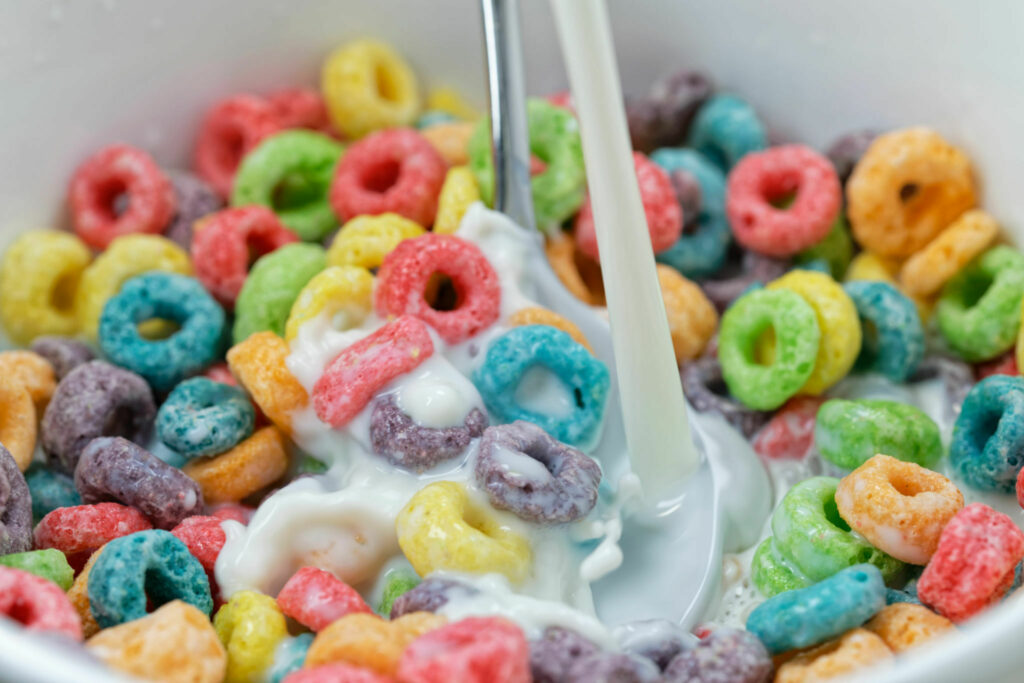
We all know that kids’ cereals in colorful boxes should be avoided due to their frighteningly high sugar content. Even more insidious are the breakfast cereals marketed as “healthy” options that also have high sugar content.
We appreciate breakfast cereals as a quick, easy, wholesome, and nourishing way to start the day. However, this is true only if they are made with whole grains and have no added sugars.
Popular choices like puffed rice, honey-coated nut cereals, and frosted flakes (whether big-name brands or supermarket own-brand equivalents) often come laden with spoonfuls of sugar.
Besides the long-term health consequences of excessive sugar, a sweet start to your day will only sustain energy levels for a short time. Once the sugary boost is digested, you’ll be left feeling hungry quickly, possibly reaching for another unhealthy option.
Ensure you check the nutritional values of your cereal and ensure there are no added sugars. Opt for cereals made with whole grains and rich in stomach-filling fiber that will help sustain you until lunchtime. Choose shredded whole wheat cereals, unsweetened corn flakes, and traditional porridge oats; however, steer clear of microwavable porridge, which may contain hidden sugary syrups for flavor.
2. Pancakes or waffles
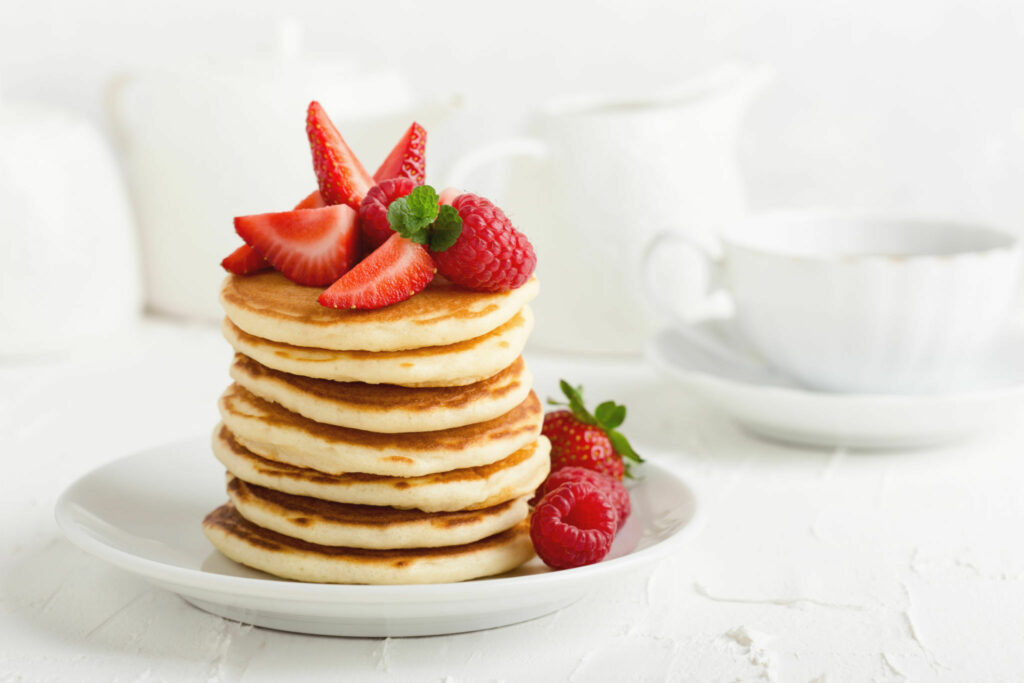
If you’ve ever made pancakes from scratch, you’ll know they’re made from flour, eggs, milk, and sugar, plus a raising agent that gives them fluffiness, such as bicarbonate of soda. Vegan pancake recipes using egg and milk substitutes and gluten-free flour options can also be used for gluten-free pancakes.
But the common denominator? Sugar! Waffles are no different. However, both are popular breakfast choices. Adding to the sugar load of a pancake or waffle-based breakfast is the fact that we don’t often eat them plain. Who does?
We load them up with sugary syrups and crispy bacon high in saturated fats and salt, increasing the calorie content without adding much to the beneficial nutritional value.
Moreover, the flour typically used for both is white flour, processed to remove the whole grain and valuable B vitamins. So it’s best to reserve these for special occasion breakfasts only!
3. Bagels and their fillings
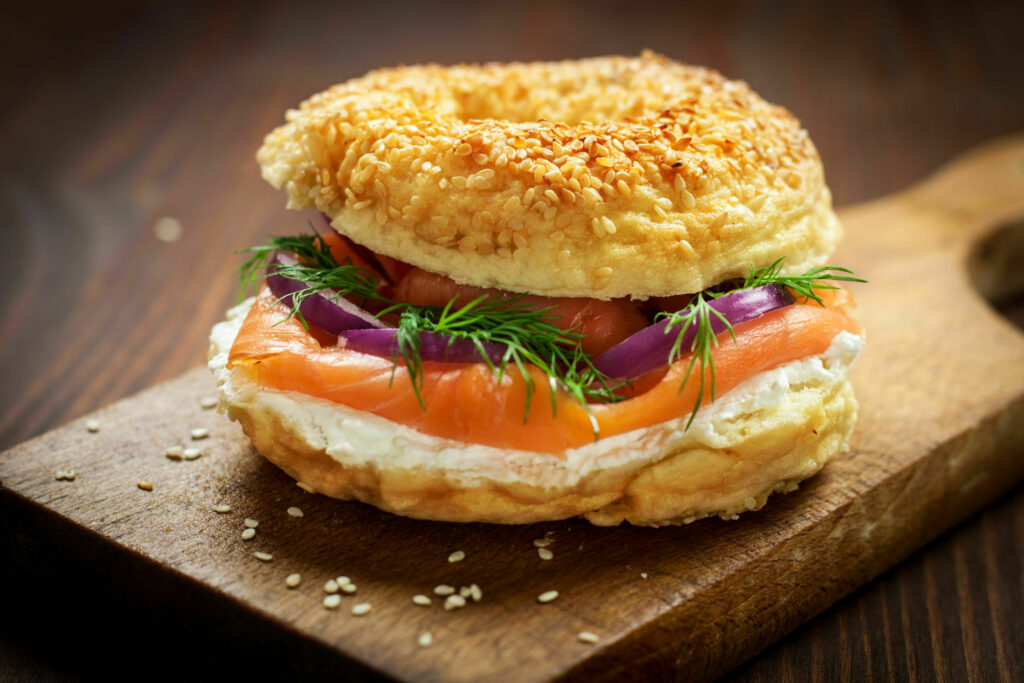
Bagels are denser than other bread products and a popular choice for on-the-go breakfasts as they tend to retain their texture better than regular bread without becoming soggy.
Most bagels are made from white flour, which, as mentioned earlier, lacks the valuable nutrients and fiber found in whole grain. So, you don’t get much nutritional value from eating a bagel.
Then there’s the issue of the most common fillings for bagels—butter, cream cheese, and salt beef—all of which are high in fat, and in the case of salt beef, also high in salt and chemical preservatives.
If bagels are your preference, limit them and try them with low-fat cream cheese, smoked salmon, or peanut butter, all of which provide beneficial protein to energize your morning.
4. Muffins and pastries
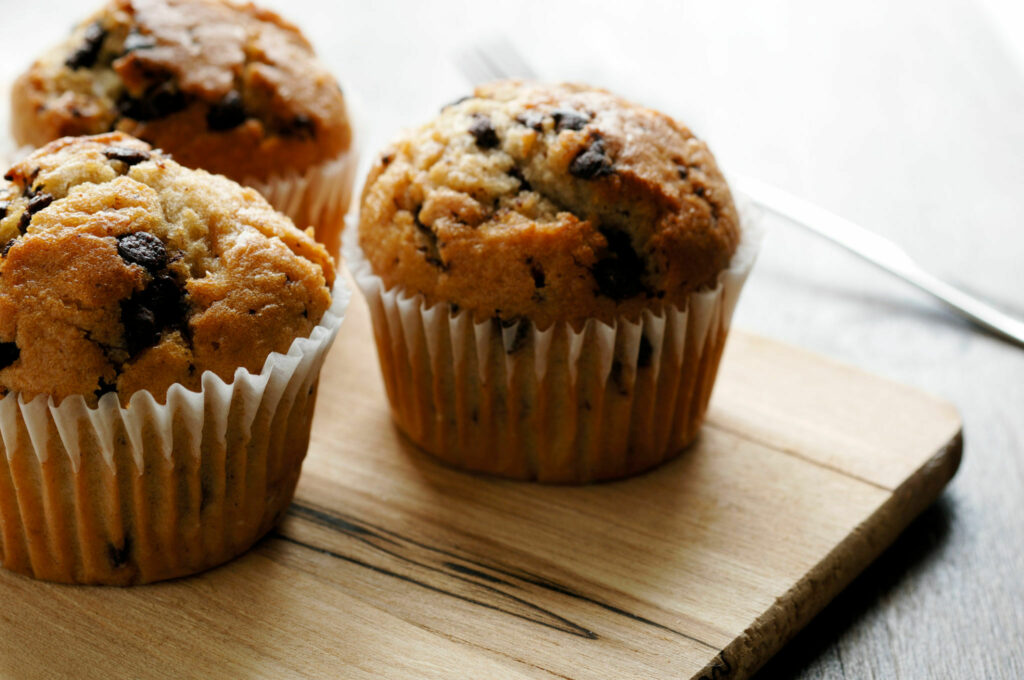
Muffins are delightful, but let’s face it, by eating a muffin for breakfast, we’re essentially allowing ourselves to have cake for breakfast, and that’s only reserved for our birthday once a year, right? Even a muffin touted as ‘healthy,’ such as a fruit-loaded blueberry muffin, is essentially a cake.
That said, a blueberry muffin at least contains fruit, which is a healthier choice than a plain muffin or, worse, a chocolate chip muffin. Blueberries are a great source of antioxidants and vitamins that support a healthy immune system, so if you’re going to opt for a breakfast muffin, choose a fruit one. Even then, save them for an occasional treat!
Savory muffins could also be a better option, but be cautious of cheese muffins high in saturated fats. We’ve come across muffins made with zucchini and minimal sugar, which may not satisfy the sugar craving, but they certainly won’t set you off on the wrong foot for the day.
The same goes for those tempting breakfast pastry baskets we see in hotels. Save them for special occasions and holidays if you want to avoid a sugar overload in the morning!
5. Fruit juice
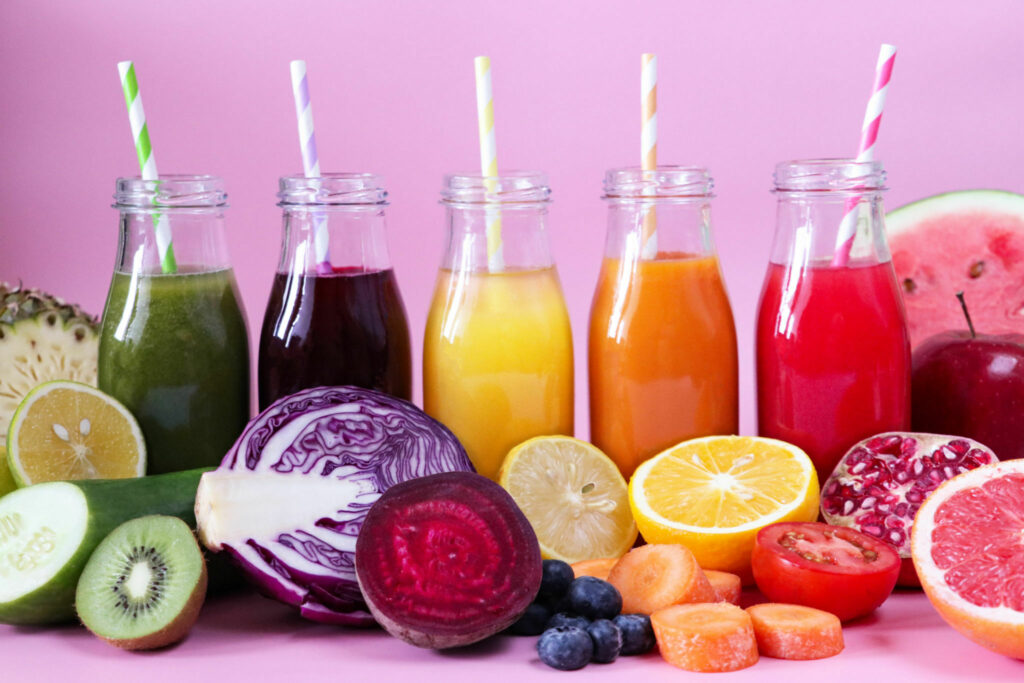
Who doesn’t enjoy coffee and orange juice with their breakfast? As a minor addition to an otherwise balanced breakfast, there’s nothing inherently wrong with a small (around 150ml) glass of fresh juice. The problems begin if you’re consuming more than this daily.
Consider oranges. How many could you eat in one go? One or two is our guess. But you could consume double that amount if you have a large glass of freshly squeezed juice (either freshly squeezed or store-bought).
Oranges are healthy, as are any other fruits used to make juices. They have high levels of vitamin C and other vitamins and minerals. However, fruit also contains fructose, a fruit sugar. If you’re consuming one or two oranges, then you’re not ingesting much fructose. But take that to four or more oranges in one sitting, just as a drink, and you’re consuming more sugar than you realize. So if we drink fruit juice alone for breakfast, we’re likely to feel hungry quite soon after.
Fruit juices also lack the fiber present in the fruit because you’re not consuming the pulp. Fiber is crucial for long-term gut health. Consume whole fruits and limit juices. And certainly, steer clear of fruit juices with added sugars!
6. Low fat or fat free yogurts
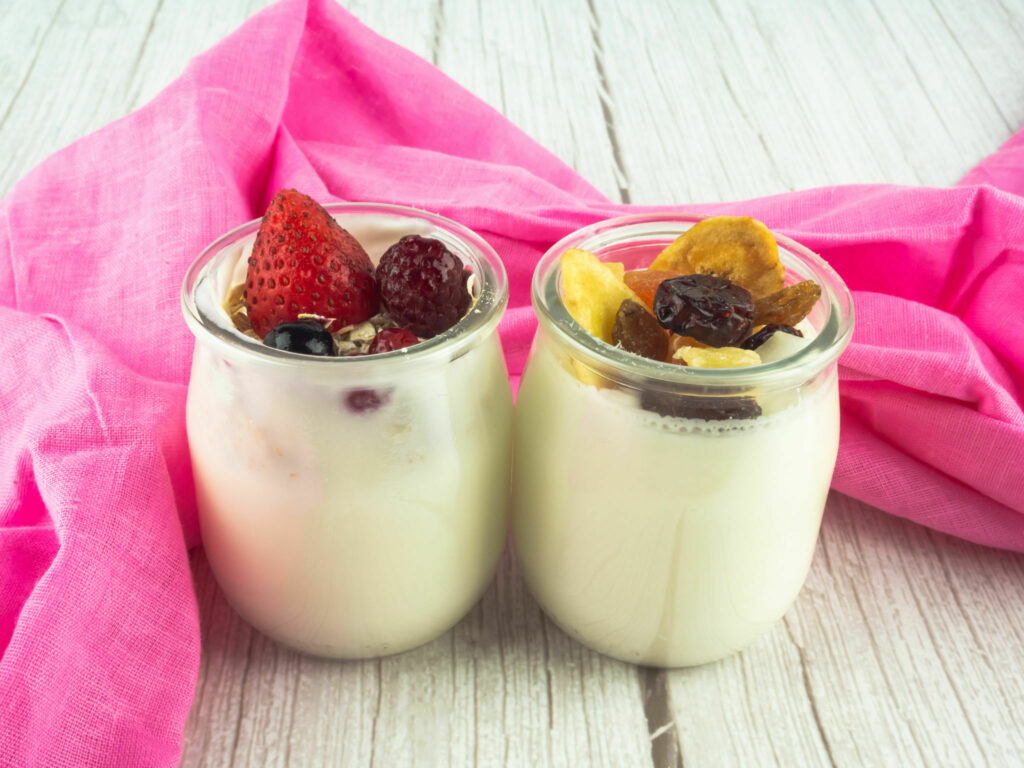
Yogurt, whether made with cow’s milk or a non-dairy option like soy, is healthy as it’s rich in protein and probiotics (good bacteria that contribute to a healthy gut).
So, at first glance, we might think that a low or fat-free yogurt is healthier. However, be cautious. Fruity varieties of these supposedly good-for-us yogurts often contain more added sugar than the full-fat varieties! (Even plain or Greek-style low-fat yogurts often contain added sugar.)
The issue is that fats and sugars make things taste good. Remove one, and often the other is added to enhance the flavor. So if something is marketed as low-fat, always check the ingredient list and nutritional information for hidden added sugars.
They might be listed as sugar, sugar syrups, honey, or glucose. When in doubt, check the traffic light system. If the label is red for sugar, then chances are your ‘healthy’ breakfast yogurt contains added sugars.
Also, low-fat yogurt without added sugars isn’t very calorific and will only keep you satisfied for a short time. Add some fruit of your choice and sprinkle with chopped nuts or oats to create a pleasantly healthy, balanced, and filling breakfast.
7. Breakfast bars
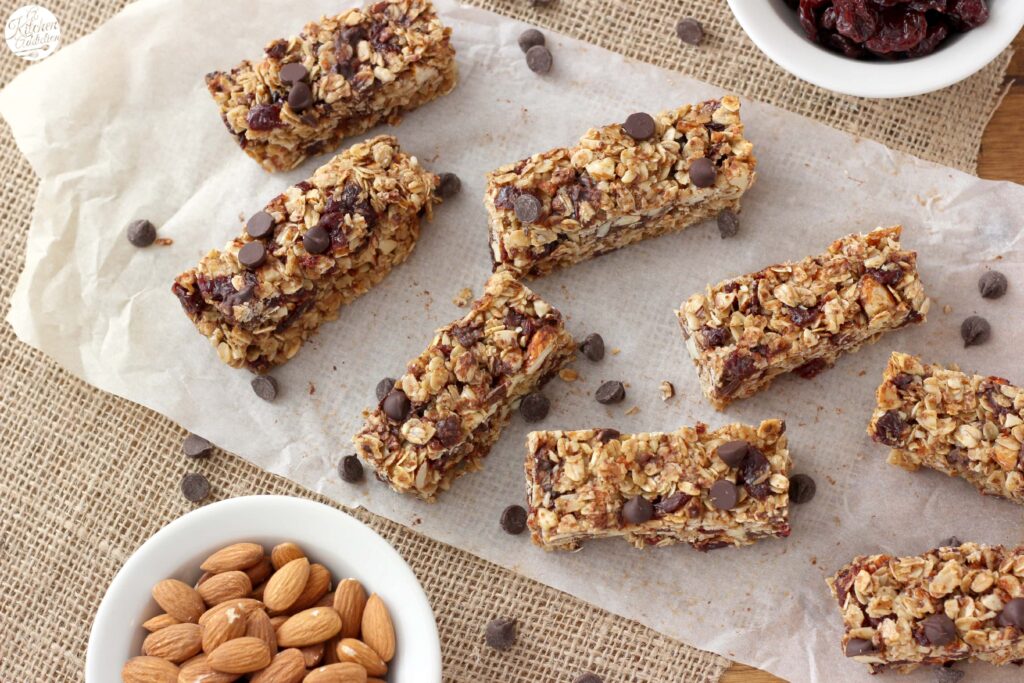
If there ever was a food that’s been more falsely marketed as a healthy option than breakfast bars, we’d be hard-pressed to find it. Often sold as alternatives for athletes and those who exercise regularly and lack time to prepare a granola or muesli, breakfast bars need to be approached with care.
This is because they’re often far from the healthy cereal replacement they claim to be. So, our advice is to read the label. Like most cereals we mentioned earlier, breakfast bars often have high levels of added sugar, usually from the sugar syrups and honey used to bind everything together into a bar shape.
Also, because they’re not consumed in a bowl with cow’s milk or a non-dairy alternative like soy or almond milk, they lack protein. Protein keeps us fuller for longer, so eating one of these bars for breakfast means your stomach will rumble shortly after.
Opt for those with lower sugar levels, no added sugars, and an added protein source such as peanut butter. Or choose a healthier version of them with a glass of milk.
8. Bacon and other processed meats
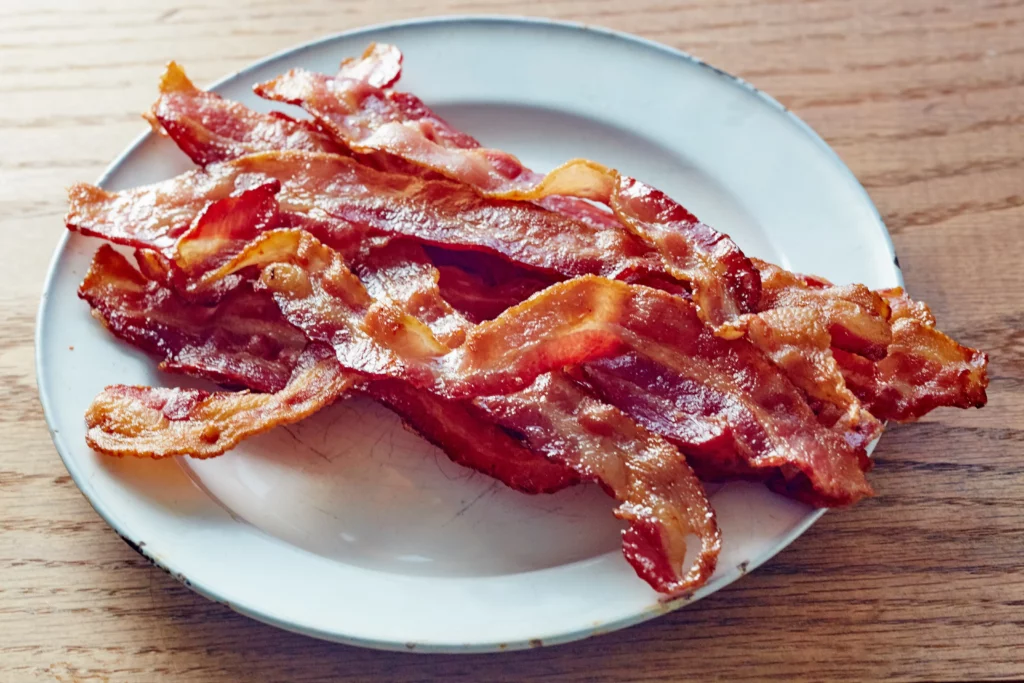
Bacon, sausages, pork, and other processed meats could taste nice, but that’s generally due to the included salts and the handling strategies used to attract our tastebuds. (Well, those of meat eaters, anyhow.).
Processed meats are high in hydrogenated fats, which are very calorific. Consuming such foods can cause health issues, including weight gain.
Contributing to the trouble is the level of salt commonly discovered in these sorts of meats. Eating way too much salt can, at ideal, make us feel thirsty and dehydrated. Also, refined meats are linked with problems later in life with the belly and intestines.
On the bonus side, bacon and sausages offer healthy protein, which keeps us full and maintains us for all the tasks we need each early morning. But a more nutritious breakfast alternative rich in pet protein is eggs, so choose a couple of poached, boiled, or clambered wholemeal toast for an energizing, healthy, reduced-fat breakfast.
We’re not saying to stay clear of bacon and sausage completely. If you delight in consuming them, conserve them for the periodic weekend morning meal and prevent consuming them daily.
9. Fast food breakfast items

Envision the scene. You’re worn down, running late for work, and you have a large meeting to participate in without time to repair your fatigue with a healthy smoothie mix. Or you’re, in fact, promptly for work as you have a due date to satisfy. However, you had a few way too many drinks last night, and you have a hangover.
What are you most likely to do? Like so many of us in this situation, there’s absolutely nothing for it– you have to go using the local junk food takeaway and get something from there. Sausage muffins, cheese toasties, hash browns, and bacon butties– you call it, you can discover it.
And sure, you’ll get an immediate choice me up. But it will only be short-lived and might only obtain you via your conference or deadline after you feel the collision coming on.
Fast food breakfasts are typically fried, refined, or both and contain high degrees of hydrogenated fats and salts. If we add in a carbonated beverage or massive juice, they are also greatly sugar-packed. None of which is a healthy and balanced way to start the day. If we make these options early, we’ll likely make them throughout the day.
10. Sugary coffee drinks

If you need a coffee (or two) in the morning before you can function or even think of commuting or speaking to a coworker, you’re not the only one. Millions of us turn to the coffee pot every early morning, bleary-eyed and dazed. After that ping! We’re wide awake and all set to encounter the day.
There’s absolutely nothing inherently unhealthy with coffee. It’sIt’s abundant in antioxidants that help maintain the body’s immune system healthy and can lift our mood no end.
However, it significantly depends on how we choose to drink our coffee. Let’s drink extra-large cups of coffee with complete-fat milk milk, calorific nut milk, sugar, and elegant syrups. We’re adding lots of calories in the form of fats and sugars.
Suppose we’re eating among these elegant coffees and another harmful breakfast choice. In that case, we could be setting ourselves up to surpass our daily calorific consumption. Yet on the other extreme, if we’re only eating a black coffee for our morning meal, then we’re not only in a calorie shortage and finding it hard to feel energized, we’ll be losing out on the beneficial nutrients, fiber, and protein we’d get from a well balanced, healthy diet.

